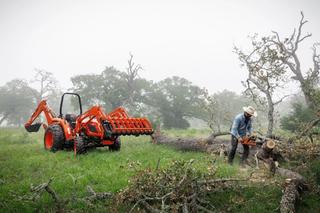How to Prepare Your Tractor for Cold Weather
Winter is Upon Us


Winter is almost here, and before the change in seasons, it’s important for tractor owners to think ahead and prepare for cold weather work. Winter conditions can be harsh on your tractor, but proper maintenance is crucial to ensure your equipment performs at its best.
Whether you plan to use your tractor for seasonal jobs or store it until spring, preparing it for winter will optimize efficiency, extend its overall lifespan and minimize downtime. Below, we’ve outlined three key tips to keep in mind as you plan for winter.
Tip One: Plan Ahead
Don’t wait until winter arrives to prepare your tractor for the cold. By planning ahead, you can avoid expensive repairs and ensure your machine operates at maximum efficiency all year.
First things first — prepare your fluids. Depending on your region’s climate, swap your tractor’s antifreeze, engine oil and fuel with winter-grade options designed for your specific area.
Consider using fuel additives to stabilize the fuel in your machine, preventing deposits from clogging. Let your machine run for 15 minutes to allow the conditioner to spread throughout the system. Winter-grade oil will keep your tractor lubricated during colder months. If you’re unsure about the specific winter-grade fluids recommended for your tractor, consult your owner’s manual or dealer for guidance.
In cold weather, your engine may struggle to start. A block heater can help alleviate this issue, not only making it easier to start your tractor but also by reducing wear on the engine and increasing fuel efficiency. Battery blankets keep your battery at a consistent temperature, ensuring optimal performance in cold weather.
To prevent slipping and sliding on snow and ice, your tractor may require tire chains. These will keep you and your machine safe during inclement weather, especially on uneven surfaces and inclines. For additional stability, weight ballasts allow for stronger control if you’re using attachments.
Winter tires offer improved traction, making them a good option for snowy or hazardous conditions. By considering these winterization options, you can ensure your tractor is well-equipped to handle the challenges of cold weather.
Tip Two: Create a General Maintenance Checklist
To ensure your tractor is in top condition, it’s recommended that operators establish a winter maintenance schedule. This routine inspection will help identify any potential issues before they become major problems. By following a regular maintenance plan, you may be able to prevent issues caused by cold weather and increase uptime.
Before starting your winter maintenance routine, familiarize yourself with your tractor owner’s manual to ensure you’re aware of any specific recommendations and guidelines. When inspecting your tractor, make sure to check tires for proper inflation, cracks and tread wear. Underinflated tires can compromise traction and performance, especially on snowy or icy conditions.
Make sure your tractor’s lights, including headlights, taillights and indicators are functioning properly to ensure maximum visibility in low-light winter conditions. In addition to checking your lights, don’t forget to inspect belts and hoses, which can be particularly susceptible to damage in cold weather. Keep an eye out for excessive wear and replace any damaged parts promptly to avoid costly downtime.
Make it a habit to regularly lubricate moving parts, check for leaks and inspect fasteners to ensure your tractor is running smoothly and efficiently. Your machine and future self will thank you for taking extra steps to perform regular checks and upkeep.
Tip Three: Don’t Overlook Storage Prep
When storing your machine for the winter, follow these tips to ensure a smooth transition come spring. Before storing your machine, thoroughly clean it to remove dirt, debris and moisture that can cause erosion or rust. Cleaning your machine before storage will not only protect it from damage, but also make next season’s preparation easier.
Before storing your machine, don’t forget to perform routine checks to ensure everything is in working order. Check your machine’s fluids, focusing on coolant, hydraulic oil and transmission fluid, to prevent condensation and ensure smooth operation.
Disconnect the battery and store it in a warmer location, as low temperatures can drain it during long periods of nonuse. Apply anti-corrosion spray and protective wraps to your machine to prevent damage from inclement weather such as rain, snow and extreme temperatures.
Once your tractor is ready to be stored away, you’ll want to find the ideal location for your machine during inclement weather. Leaving your tractor exposed to cold weather or wet snow can lead to cracks in your machine, corrosion and other damaging effects.
If you’re storing your machine for an extended period, try elevating the tires to ward off flat spots. Indoor or sheltered locations are best for tractor storage as they’ll protect against harmful elements. A tractor cover will help protect your machine even further. If you’re in a temperate region, sunny locations can also be good storage locations, as they’ll keep the engine warm with sunlight.
Properly preparing your tractor for winter weather is crucial, whether you’re storing it for several months or operating it in cold conditions. This helps maintain performance, ensures safety, prevents damage and extends the machine’s lifespan.
Tags:Tool Time

Acreage Life is part of the Catalyst Communications Network publication family.
















